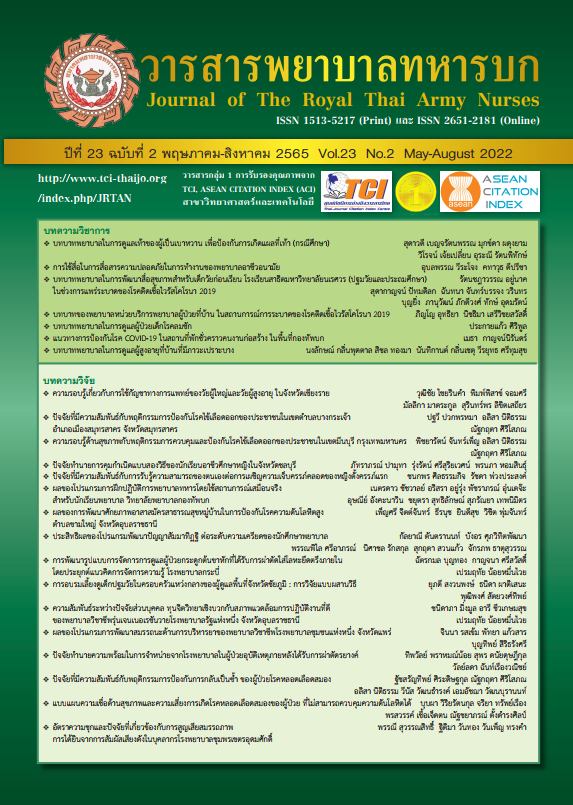Health Belief Model and The Risk of Stroke among Patients with Uncontrolled Hypertension
Keywords:
Health Belief Model, stroke, Prevention behavior, The risk of stroke, uncontrolled hypertensionAbstract
This study aimed to examine the association of health belief model with preventive behavior and risk of stroke among patients with uncontrolled hypertension. Sample is patients with uncontrolled hypertension aged 40 years and above at San Makha Tambon Health Promotion Hospital, number of 180 people, and Pa ngae Tambon Health Promotion Hospital, number of 170 people. Data were collected by using a questionnaire created by the researcher. Content validity of the questionnaire was verified by the 3 experts and the CVI was 0.89. Reliability was using Cronbach’s alpha coefficient and the reliability was 0.85 – 0.88. Data analysis were frequency, percentage, minimum, maximum, mean, standard deviation, and Pearson Product Moment (p < .05).
The results show that health belief model and the risk of stroke among patients with uncontrolled hypertension prevention behavior (r = 0.633, p < .001 และ r = 0.654, p < .001 respectively). Perceived disease severity was lowly positive correlated with the prevalence of stroke among patients with uncontrolled hypertension (r = 0.503, p < .001) and what conducive to practice has a very low positive relationship with stroke among patients with uncontrolled hypertension (r = 0.505, p < .001). Perceived barriers to behaviors for disease prevention were significantly negatively correlated with stroke among patients with uncontrolled hypertension prevention behaviors (r = -0.853, p < .001) Anyhow, Perceived induction was statistically significant associated with a low level of body mass index, waist circumference, total cholesterol, blood pressure (p < .001).
Downloads
References
Sikaew C. Public health predict Thai people suffer with stroke almost 5 millioninthe next 8 years. Thairath.14 Oct 2021;12. (in Thai)
Jaikhamwang N. Risk behaviors of diabetes and hypertension risk groups: A case study in Ban Pak Ka Yang sub-district health promoting hospital, Sukhothai province. Journal of community development and quality of life. 2018; 32(3): 51-66. (in Thai)
Becker, M. H., Maiman, L.A. sociobehavioral determinants of compliance with health medical care recommendations. Medical care. 1975; 13: 10-24.
YueraeK, Limchaiarunreung S, Singhchangchay P. Promoting Islamic exercise in housewives, Pattani province. Journal of graduate school of Islamic university of Yala. 2018; 5: 83-96. (in Thai)
PhaitrakoonJ, Chulakarn N. Cultural Understanding of Health in Thai Elderly Muslims Journal of Princess Naradhiwas University.2016; 8:142-152. (in Thai)
Hmadsa S. Effects of self-management program on glycemic control behaviors and a1c in Muslimwomen with stroke. Bangkok: Rangsit university; 2018. (in Thai)
Sahaphan A. Factors predicting diabetes prevention behaviors among those at risk For stroke. Bangkok: Mahidol university. 2017. (in Thai)
Jindawattanawong A, Peiysue N, Nintajan P. Relationship between perceived health beliefs and protective behaviors of Stroke in high school students. Journal of ramathibodi nursing. 2018;18: 58-69. (in Thai)
Joychoo N, Pinyopasakul W, Chareonkitkarn V.Relationshipsamong Age,Perceived Benefits of Health Behaviors, Perceived Barriers of Health Behaviors and Health Behaviors in Patients with Ischemic Stroke. Ramathibodi Nursing Journal. 2018;20:236-248. (in Thai)
Buapum P, Kulrattanawiroj P. Health promoting behaviors of patients with chronic illness in Chainat province. Journa lof Thaksin university. Issup 2020; 14(3).199-205 (in Thai)
Tangthanapongsa A. Factors affecting health promoting behaviors of Stroke. Nakhon Pathom: Christian university. 2018. (in Thai)
Annesi J, Gorjala S. Relations of self-regulation and self-efficacy for exercise and eating and BMI change: A field investigation. Biopsychosocial medicine. 2018; 10: 12-28. (in Thai)
Khamtanod S, Kengkanpanich T, Tansakul S, Kengkanpanich M. Applicationof self-efficacy theory to behavior modification diet and physical activity of women with obesity Samkohhospital, Ang-Thong province. Journal of health education. 2018; 36: 30-44. (inThai)
Kessin J, Wiruchagool P, Lohnil A. Selfmanagement knowledge, quality of life in new cases with, of Stroke patients selfmanagement program inurbanareas, Uthaithani province. Journalof nursing prince of songkhla university. 2018; 40: 84-103. (in Thai)
Intrarwichian S. Changing health behavior by participate to sustainable in the Stroke risk group, Kasetwisai district, Roi-et province. Journal of disease prevention and control 6. 2018; 19(2): 65-75. (in Thai)
Silangirn P. Factors Related to Self-care Behaviors among Elderly of Phayao Province. Journal of The Royal Thai Army Nurses. 2018;17(3):54-62. (in Thai).
Downloads
Published
How to Cite
Issue
Section
License
Copyright (c) 2022 Journal of The Royal Thai Army Nurses

This work is licensed under a Creative Commons Attribution-NonCommercial-NoDerivatives 4.0 International License.
บทความหรือข้อคิดเห็นใดใดที่ปรากฏในวารสารพยาบาลทหารบกเป็นวรรณกรรมของผู้เขียน ซึ่งบรรณาธิการหรือสมาคมพยาบาลทหารบก ไม่จำเป็นต้องเห็นด้วย
บทความที่ได้รับการตีพิมพ์เป็นลิขสิทธิ์ของวารสารพยาบาลทหารบก
The ideas and opinions expressed in the Journal of The Royal Thai Army Nurses are those of the authors and not necessarily those
of the editor or Royal Thai Army Nurses Association.






